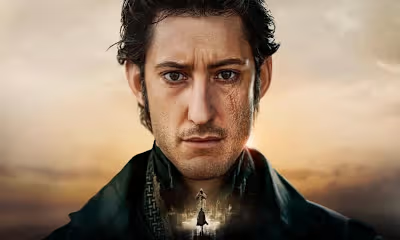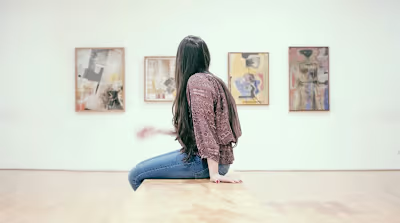THE GREATEST HITS, a poetic allegory of mourning – Review
THE GREATEST HITS tells the story of Harriet's desperate attempts to save her boyfriend from a tragic car accident using pieces of music that allow her to travel back in time. However, a present-day encounter could change everything and challenge the young woman's beliefs.
Released in a limited number of theaters on April 5, 2024, in the United States before finding new life on the Disney+ SVOD platform, THE GREATEST HITS is led by director Ned Benson, one of the screenwriters behind Marvel's Black Widow and the filmmaker behind The Disappearance of Eleanor Rigby, his only other feature film.
Here, the introduction is skipped—there’s no depiction of tragedy striking in the midst of a calm and happy life, no moment of discovery for Harriet’s power. Instead, the audience is immediately immersed in the young woman's desperate attempts to prevent the death of her boyfriend, Max, by traveling back into the couple’s past. Their memories are intertwined with the music that once accompanied their moments of happiness but also with the tragic car accident that would claim the life of the man she loves. From then on, her life is defined by an obsessive quest: finding the one song that could save him.
The first part of the film focuses on this grief and the struggle of life after loss. Despite being a promising music producer, Harriet's daily existence has become dull, marked by a monotonous job and regular visits to a support group led by Dr. Everlyn Bartlett, played by Retta, one of the stars of the series Good Girls. Adding to her struggle is a major obstacle—she is forced to wear headphones that prevent her from listening to the songs that would inevitably (and literally) pull her back into the past.
For this musical film, the director also pays special attention to the sound design. Some ideas are particularly well-executed in introducing the unique function of Harriet’s headphones. For instance, the first time she puts them on, the audience is immediately immersed in her world—from the music she hears to the muffled voices and ambient noises around her, as if the headphones had been placed over their own ears.
As expected in a musical film, references abound. The narrative is punctuated by both timeless classics and contemporary tracks, ranging from indie artists to hits by Lana Del Rey—certain to evoke nostalgia for some viewers.
Ultimately, the sci-fi aspect of the film remains secondary, serving instead as a poetic allegory: Harriet must choose between finding the song that could save her past or creating new memories set to different songs that might help her move forward into the future. After all, she can no longer listen to the songs she already knows without being pulled out of her own reality.
The theme of losing a past love is quite classic in itself, but it will resonate with many viewers—just like those songs we can no longer listen to because they inevitably bring us back to certain memories, whether joyful or painful. It’s a feeling shared by many, a simple yet universal emotion, and it adds an original dimension to the film’s allegory of grief and its different stages.
But beyond the drama, THE GREATEST HITS is also a romance. Harriet's love interest, David, whom she meets in her support group, is kind, slightly awkward, and their relationship feels natural, both in moments of connection and in moments of hesitation. Justin H. Min shares great chemistry with Lucy Boynton, who seems like the perfect choice for the role of the heroine. Already familiar with musical films, from Sing Street to Bohemian Rhapsody, Boynton brings authenticity to Harriet’s journey.
Their budding romance isn’t overly idealized but instead reflects real human relationships—genuine in both its smooth moments and its awkward silences. The friendship between Harriet and Morris, played by Austin Crute, the only person aware of her unusual power, is also portrayed with sincerity. Their dynamic feels real—Morris is supportive but also concerned that Harriet seems unable to move on. He gently reminds her of this at times, not by pushing or provoking arguments, but through subtle conversations where his worry is evident. He cares for her, but ultimately, he lets her live and make her own choices.
Once again, the film’s fantastical element doesn’t take away from its deeply human themes—relationships, their struggles and successes, both romantic and platonic. Harriet has a chance to love again, but she remains trapped in her memories. Meanwhile, David, despite his patience, grows frustrated with her inability to look toward the future. These are broad, familiar themes—perhaps predictable—but ones that will always remain relevant and emotionally resonant. However, one drawback is Harriet’s lack of true growth, as the story ultimately seems to go in circles without meaningful progression.
It’s also impossible to discuss THE GREATEST HITS without addressing its ending, which chooses not to explore the idea of life after grief in depth. The conclusion feels too easy—an open-ended resolution that flirts with Deus Ex Machina. It contradicts much of what the film seemed to be building toward, leaving an unsatisfying aftertaste. It’s as if everything that happened before didn’t really matter, because a last-minute twist (on a platform owned by Disney, no less) can magically fix almost everything. Up until this point, the audience could deeply connect with Harriet’s pain, but the ending distances them from her, failing to deliver any concrete lesson or resolution.
And this is the biggest issue with THE GREATEST HITS—the film builds anticipation for Harriet’s final decision, the crux of the entire narrative, only to fall into convenience. The ending hesitates, refusing to fully commit, leaving everything up to the viewer’s interpretation. Depending on how one chooses to interpret it, the film can take on entirely different meanings. But rather than offering an ambiguous ending with purpose, it feels more like an unresolved idea. One can’t help but wish that the director had fully embraced his vision, giving the film a more definitive and impactful conclusion—one that, unfortunately, never arrives.
In the end, THE GREATEST HITS seems to rely on the originality of its concept to deliver a love story that deserved a better conclusion. And while this musical film can be watched with nostalgia and goodwill, it ultimately falls flat in its ending and misses the mark.
Kimberley SANSON
Like this project
Posted Mar 29, 2025
A review of the movie THE GREATEST HITS
Likes
1
Views
6






